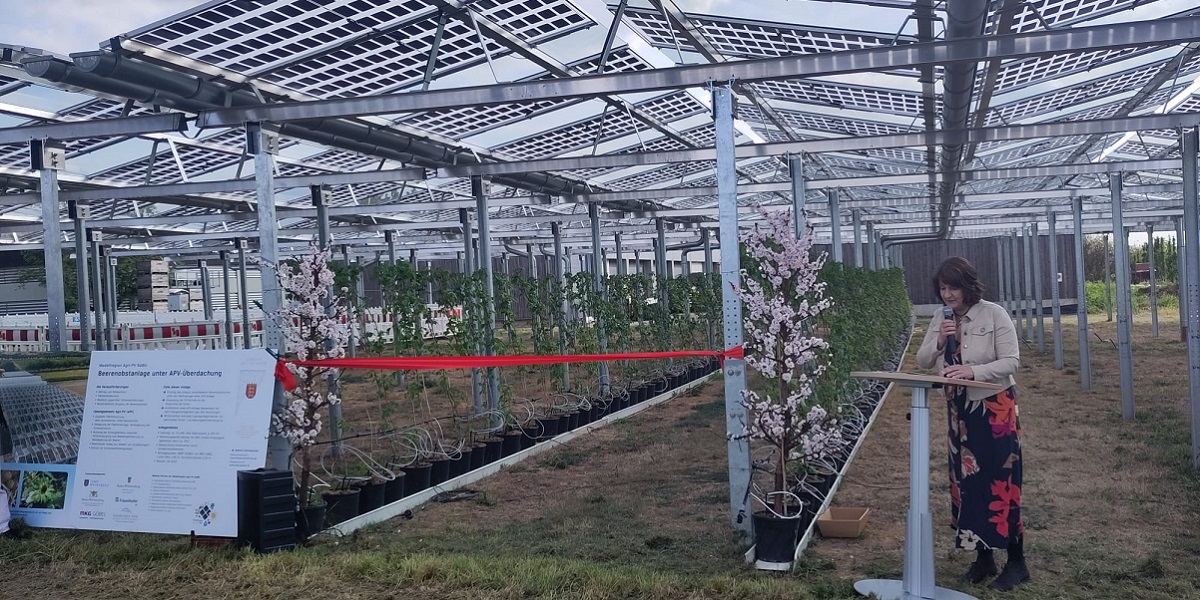From pv magazine Germany
As part of the Model Region Agri-photovoltaics for Baden-Württemberg research project, the third LVWO pilot plant has gone into operation at the Heuchlingen experimental fruit farm in Bad Friedrichshall, Germany.
Combining power generation with the cultivation of soft fruit, farmers are increasingly employing protection systems against cold, rain, hail, and excessive solar radiation. Pests are kept at bay through the use of nets. The installation of solar modules has the potential to generate sustainable synergy effects, according to Baden-Württemberg's Ministry of Food, Rural Areas, and Consumer Protection.
The Fraunhofer Institute for Solar Energy Systems reports that the agrivoltaic system at the Heuchlingen farm has a capacity of 113 kW. Researchers will examine the effects of the facility on the cultivation of raspberries, blueberries, currants, strawberries, gooseberries, and blackberries on an area of nearly 2,000 square meters. To explore resource-saving cultivation techniques, the facility incorporates fully closed circuits for water and nutrients.
“Rainwater is collected, stored and used with fresh water for irrigation,” said Oliver Hörnle, a project manager for Fraunhofer ISE. “Excess liquid from the substrate in which the berries grow is collected, processed with the help of a solar-powered system and also reused.”
As part of the research project, the LVWO, the Fraunhofer ISE and 11 other project partners are building and testing a total of five agri-photovoltaic pilot systems in Baden-Württemberg. Researchers will seek to gain experience and knowledge for the practical implementation of agri-PV systems, examine innovative approaches, clarify legal framework conditions, and make the technology available for practical use.
In Austria, meanwhile, RWA Solar Solutions and Frutura are testing the combination of PV and apple cultivation in the Pöchlarn eco-solar biotope.
Under the project's 4.1 MW system, researchers are actively testing several variants of agrivoltaics. Frutura has approximately 300 apple trees on a test area of around 900 square meters. Additionally, a reference area of approximately 640 square meters with 200 trees is being observed, which is protected by a hail net instead of solar modules. According to Frutura, the initial results are positive: the unique microclimate under the photovoltaic system enhances tree growth and accelerates vegetation development. However, continuous use of a drip irrigation system is necessary due to rainwater shielding.
This year, Frutura aims to examine the effects of the PV system on the behavior of beneficial insects and pests, as well as on the formation of flower buds, fruit size and hail protection.
This content is protected by copyright and may not be reused. If you want to cooperate with us and would like to reuse some of our content, please contact: editors@pv-magazine.com.



Thank you for your information.
The GHG emissions reductions has to be facilitated towards net zero emissions reductions to address climate change impacts while supporting achieve UNSDG’S.
Thus, the abstracts of energy-water-food-healthcare-environment nexus was already submitted at Asian Development Bank with market test for innovation funding from CLIMA-EU-ACTION as well.
With that, I drafted functions of consulting, construction, trading, non-profit NGO, enterprise development assistance, economic and environmental sustainability, and advertising.
Germany, along with several other countries are far ahead of the United States in agri-solar research. I have spoken with many individuals over the last year and a half about involving my 3-4 acre property in Tucson, AZ in agrisolar research and education. There is a very small site located at Biosphere II operated by the University of Arizona north of town, but that’s about the only representation of interest in the entire arid southwest. All seem to agree that it’s greatly needed for projected research opportunities, but so far, no meaningful responses from the people who are involved. Very frustrating!
J.C.Luepke
Tucson, AZ